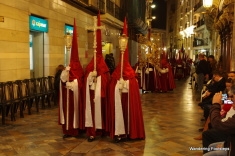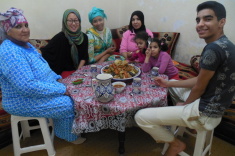The worst day on the road is still better than the best day in a house.
It was our overlander friend, Ana, who declared this to us a couple years back, as we all sat on camping chairs between our two rugged vehicles on a balmy African evening. Both Bruno and Josu, her husband, nodded in enthusiastic agreement; I, however, imagined loads of situations where that wouldn’t be true for me. But, seeing the reactions of my more experienced overlanding companions, I refrained from speaking – I was obviously the odd-one-out in the group.
If there’s one way in which the dissimilarity between Bruno and me manifests itself, it’s when we’re in a house. Basically, Bruno absolutely loathes it, while I’m soaking up every single moment.
.jpg)
Back in France… in a house!
.jpg)
Our house in France
Bruno is nomadic through and through. He loves many things about his overland lifestyle, but what he loves most is the fact that his home has wheels. Put him in a house that doesn’t move and he’ll be restlessly pacing around the space within days.
I, on the other hand, have a domestic side to my adventurous nomadic streak. I relish a bit of comfort, a nice big kitchen, and the chance to create a routine. When we unpacked Totoyaya this March and settled into Bruno’s house on the Mediterranean Coast of France, I happily made myself at home while Bruno, well, he s’est fait chier (a French expression that can’t quite be translated but perfectly expresses his feelings – a rough stab would be something like “to be bored shitless”). For the first several nights, he couldn’t even sleep inside the four walls of this “tombeau des vivants” (or “tomb of the living,” according to the very nomadic Touareg people, whom Bruno admires).
As if to prove a point – that houses were horrible – bad stuff kept happening to Bruno in those first few housebound days. First was the electricity bill that seemed to indicate we would soon owe a whole heap of money. It took several phone calls and a lot of waiting on hold with that annoying elevator music to learn the innocuous truth of the matter. Then there was the data SIM card we ordered online. Bruno made a typo when inserting his email address and it took him a week to successfully contact them, correct the error, and get online.
The icing on the cake, however, was definitely the flat tire incident. Pulling into the driveway with his father’s car, Bruno got a flat. He looked everywhere for the spare, only to learn (after several phone calls) that he had to call Citroen’s version of AAA. That night, a lady came to fix his tire – except that she didn’t fix it, she just took the inner tube to her shop. The following day, someone came with a new tube, changed it, and then had us drive to the shop because the tire itself had been blown and needed to be replaced. It was almost twenty-four hours after the incident that the tire was repaired and the vehicle roadworthy again.
A society in which it is this complicated to resolve such a simple problem is not a society in which Bruno wants any part.
I felt badly for Bruno, but I felt just as badly for me for feeling so splendidly wonderful in our house. I no longer noticed the cold; I could read into the wee-hours of the night without a sleeping man next to me sending me his sleepy vibes; and best of all, I had a giant kitchen – with an oven – to play around with!
.jpg)
Bruno not having too much fun in our house.

Me having LOTS of fun in my house, particularly with my oven!
I had to face the fact that I was having fun creating a routine. In our house, our mornings start out with the same early-morning breakfast as in our camper van, but that’s where the similarities with our other life end. Our days are spent fixing up the house and driving (or cycling) around town running errands rather than fixing up Totoyaya and driving across countries exploring.
On Wednesday evenings, I go to a zumba class; on Thursday mornings, Bruno and I go to a private yoga class near his parents’ place then pop by their house for lunch. On weekends we host lunch parties for family and friends, and most weekdays Bruno heads to Sête to prepare to get his truck driver’s license.
It’s the evenings that are the most dissimilar to our life-on-the-road, however. Bruno is so emotionally and mentally exhausted that he unwinds in front of the TV; sometimes I join him (we even have TV routines now, like Tuesday night “The Island” and Saturday night “The Voice”!), and other times I read. We stay up so much later than in Totoyaya because we’re less physically tired and because our bed is not right in front of us staring us in the faces.

On our way to our weekly yoga class in Bessan.

Hosting lunch parties for family and friends at our place on weekends.
The evenings have become my favourite part in our house, whereas on the road it’s my least favourite. Perhaps it’s because we’re working so much during the day that evenings now represent relaxation.
I’m starting to remember what it’s like to be a normal person.
So why, you may ask, do I choose to be an overlander if I’m digging the domestic life? The answer is simple: I’m complicated.
I’m going to go ahead and be vulnerable right now and share some deep, personal feelings. I have two sides to me that are diametrically-opposed, and it’s been a lifelong struggle to feel at peace with both my yin and my yang. Whenever I lived abroad, I dreamed about being in Canada, and when I lived in Canada, I craved travel. When I worked, I yearned for freedom, and when I was free I aspired to work.
My split-personality has never felt as much at peace with itself as when I decided to be an overlander, but that doesn’t mean everything is perfect. Sometimes I have an urge to feel grounded, to have a community, to explore a single place in-depth, and to create a routine.
Now is one of those times. The difference this time is that I’m wiser. I know that once I’ve created those things – the stability and routine – what I’ll want most is to destroy and uproot it all. So, instead of looking too deeply into my current state of happiness, I’m simply enjoying playing house with the knowledge that soon this will all grow old and I’ll be happy to rough it again in the name of travel and adventure.

Preparing romantic dinners-for-two in our huge, warm and cozy kitchen.

Appreciating the comfort, luxury and routine until the itchy feet take over again.
Until that time, I’m enjoying little luxuries like having a closet and a washing machine, as well as some not-so-little things, like having a giant kitchen, a hot shower and nearby toilet, and the space in which to hide comfortably from the cold, do yoga, and extend my evenings. Even Bruno appreciates all of those things (well, besides the kitchen – he doesn’t give a crap about that!) – it’s just that, for him, the price he has to pay – of responsibility and immobility – is way too high for the return.
Sometimes, in the evening, Bruno will watch a documentary on a different country or culture. I’ll glance up from my book, and, despite myself, feel my feet becoming itchy.
Maybe Bruno and I aren’t so different, after all. I mean, even though I like creating routines, I’ve never liked following them. For me, the destruction of routine is just as gratifying as the creation of routine – maybe even more so. Bruno and I work because we both wholeheartedly believe in the wise words of Paul Coelho: “If you think adventure is dangerous, try routine – it’s lethal.”


